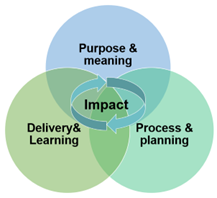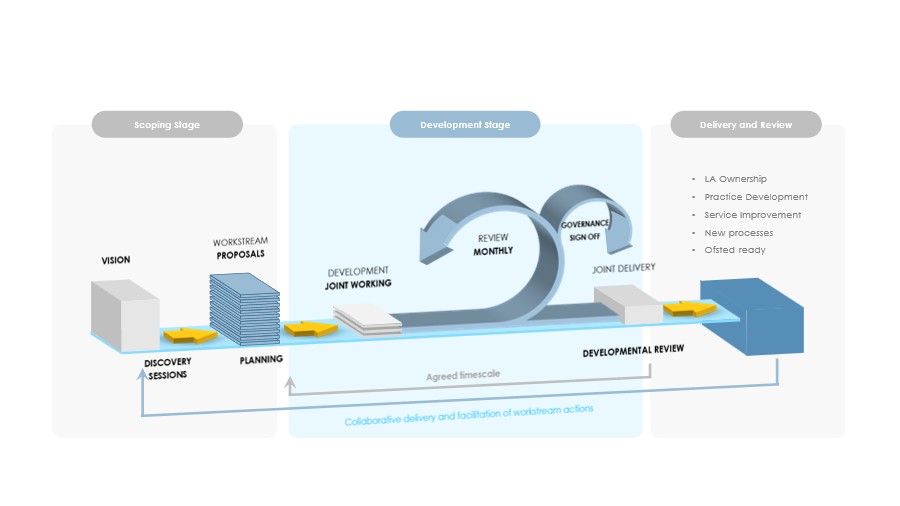This project supports National Framework Enablers 1, 2 & 3, National Framework Outcomes 1,2,3,4 and What works in SEND Enabler 4. Please click here for more details
The SESLIP Targeted Support Programme offers DfE funded targeted improvement packages of work, developed collaboratively, at no cost to the local authority (LA), approximately 40 days each including the work to establish scope and governance of the package.
We aim to make the most of the skills, experience and commitment to peer-to-peer support and challenge in the region and to align this with the funding available from the DfE.
We focus the work on what will be most useful to local authorities in the region as well as providing valuable development opportunities for colleagues to work in other LAs as part of the targeted support approach.
Over a 12 month period, we can offer 3 CSC and 12 SEND improvement support packages, and envisage that multiple packages of support will be run at the same time.
The central team has a dedicated and experienced Programme Manager which means refined project management methodology and documentation is available for enhanced oversight and coordination. Our core team includes experienced ex-local authority leaders, who have worked and director level. The team’s practice is enhanced by collaboration with subject matter experts across the region from the full range of children’s services.

Targeted Support is available to all LAs in the SESLIP area and will arrive from other SESLIP diagnostic programmes such as DCS self-assessment and peer challenge and SEND Courageous Conversations; referral from CSC and SEND Improvement advisers at DfE and LGA; CSC and SEND Universal Improvement and direct demand from LA colleagues via regional networks and forums.
To access targeted support a Local Authority, via their DCS, will work with the Targeted Support leads to determine what specific support would add value, and they will scope a proposal of work together.
For SEND targeted support this would be available following a SEND Courageous Conversation and include consideration of the local area’s priorities and current work, alongside Regional Diagnostic data where available, and feedback from SEND Courageous Conversations.
The range of topics covered in SEND Courageous Conversations across the region so far has included:
- Developing/reviewing the local area Self Evaluation (SEF)
- Transitions, including 16+
- Alternative Provision
- Timeliness/quality of new EHC assessments
- Annual Reviews
- SEND support and inclusive practice in mainstream schools
- Joint commissioning
- Coproduction and the impact of this
- Ordinarily Available Provision/Prevention and the Graduated Response
- Outcomes for children – including evidence of partnership working having positive effects
- Quality Assurance
- What happens when (following an agreement for a health assessment for example)
Targeted support can also focus on:
- Banding and funding arrangements
- SEND Sufficiency planning
- Or other topics as determined by the local area, in the context of the diagnostic activity detailed above.
Quarterly Summary Update
Q4 – Four projects delivered, 10 in delivery and a further 8 to start in FY 2026/27. Follow link here to latest newsletter.
Q3 – Eight packages of CSC and SEND regional targeted support are in development. We are actively seeking subject matter experts and will be attending regional meetings with further information to reach out to you for support
Q2 – Two packages of targeted support are underway, with two further package in scoping phase. ,
Q1 – Funding announced, prospectus complete and linked to the Regional Improvement Plan.
Please get in touch if you’d like to be involved.
For CSC targeted support, this would be available following a DCS self-assessment or a peer challenge, alongside regional diagnostic data where available, and taking into account the LAs local priorities. DCS self-assessment and peer challenge events across the region to date include: –
- Embedding the Family First Partnership model, sharing regional best practice
- Expanding Family Network Meetings and sharing practice regarding Early Help – co-ordinate pilots and share learning regionally, clarify roles, skills and responsibilities of practitioners, schools and other services in family support.
- Developing community capacity and parental networks with place-based approaches
- Regional strategy with police to target higher level child exploitation perpetrators
- Work on improving unregulated placements
- DBS flexibility for kinship carers
- Complex needs of younger children in residential care increasing (dols, tier 4 CAMHA, needs faster regional responses)
- Quality Assurance – balancing quantity vs. quality, outcomes over compliance, empowering children and families
- Focus on children missing education or at risk of care
- Challenges of delivery of education outcomes within broader social care frameworks.
Targeted Support Programme Impact Model


